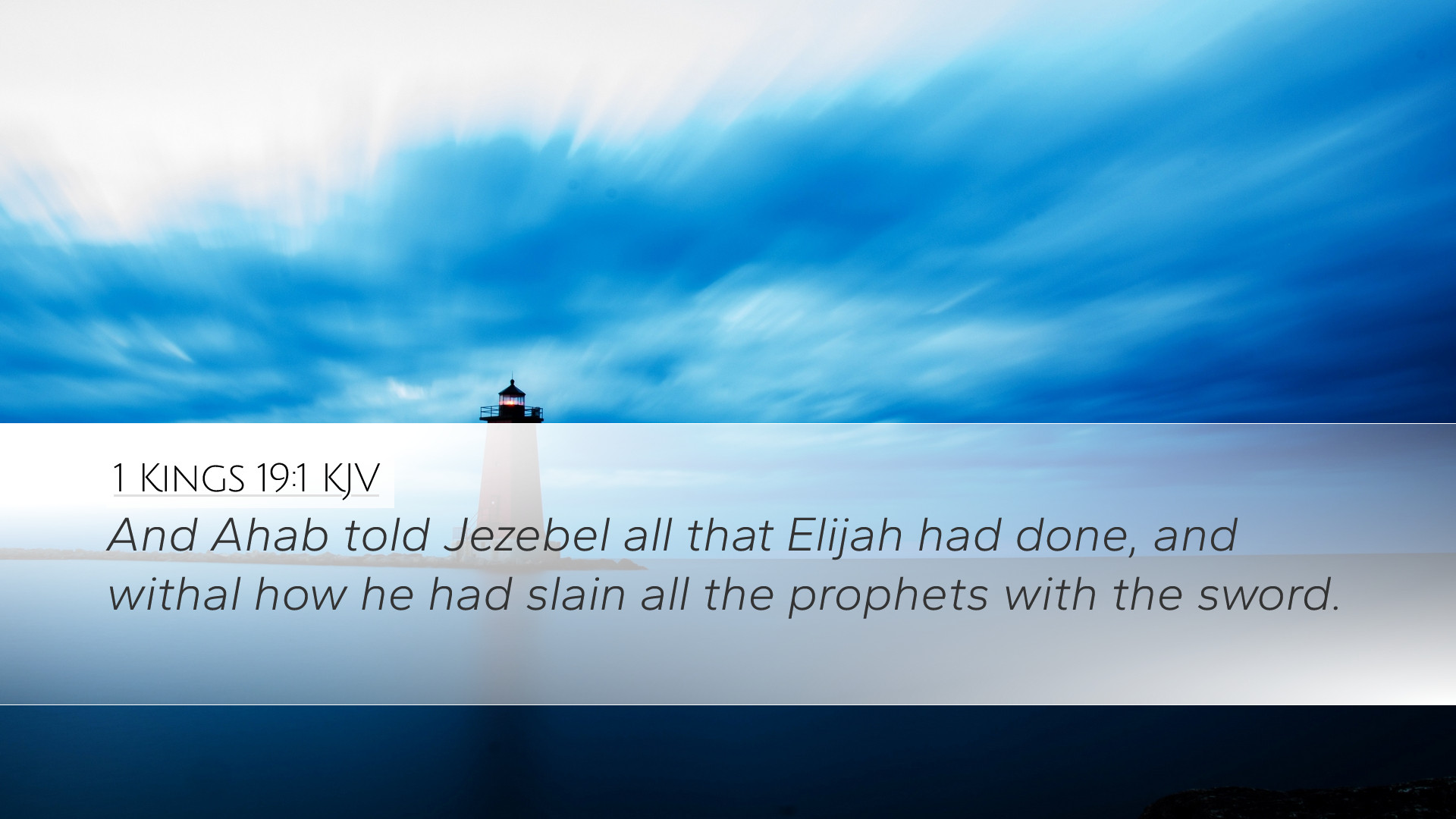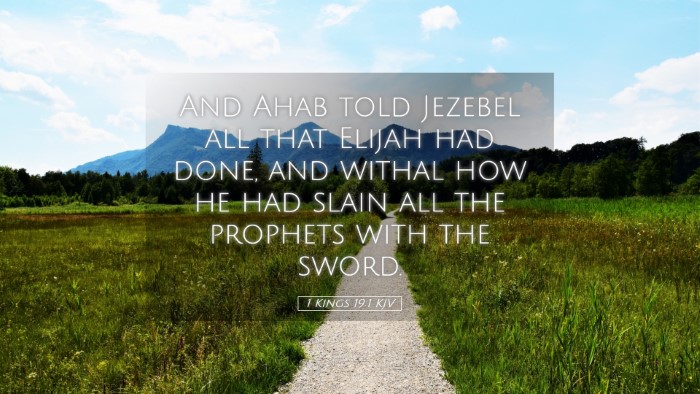Old Testament
Genesis Exodus Leviticus Numbers Deuteronomy Joshua Judges Ruth 1 Samuel 2 Samuel 1 Kings 2 Kings 1 Chronicles 2 Chronicles Ezra Nehemiah Esther Job Psalms Proverbs Ecclesiastes Song of Solomon Isaiah Jeremiah Lamentations Ezekiel Daniel Hosea Joel Amos Obadiah Jonah Micah Nahum Habakkuk Zephaniah Haggai Zechariah Malachi1 Kings 19:1
1 Kings 19:1 KJV
And Ahab told Jezebel all that Elijah had done, and withal how he had slain all the prophets with the sword.
1 Kings 19:1 Bible Commentary
Commentary on 1 Kings 19:1
Verse (1 Kings 19:1): "And Ahab told Jezebel all that Elijah had done, and withal how he had slain all the prophets with the sword."
Introduction
This passage occurs after a significant confrontation between Elijah and the prophets of Baal on Mount Carmel. Elijah's courageous stand and the subsequent divine demonstration of God’s power left a profound impact, but the aftermath reveals the hostility that arises against faithful servants of the Lord. This commentary draws insights from revered public domain sources, providing a multi-faceted examination of this verse's implications.
Contextual Analysis
In the preceding chapter, Elijah emerges as a champion of Yahweh during the contest with the prophets of Baal. The dramatic victory culminates in the slaying of the false prophets, instigating Ahab's troubling report to Jezebel.
Response from Matthew Henry
According to Matthew Henry, Ahab's report to Jezebel highlights the profound wickedness that characterized their reign. Henry illustrates that Jezebel's response is emblematic of the spiritual conflict between God's prophets and the forces of idolatry. He emphasizes the treachery and deceit embodied in her character, framing her as an adversary to divine truth.
Insights from Adam Clarke
Adam Clarke expands on the consequences of Elijah's confrontation with the prophets of Baal. He notes that Ahab’s declaration to Jezebel serves as a catalyst for her vengeful plans against Elijah. Clarke’s analysis highlights the psychological aspect of fear that Elijah experiences in the face of Jezebel's threatened reprisals. Here, Clarke encourages believers to recognize that triumph in spiritual matters does not always guarantee safety from persecution.
Albert Barnes' Commentary
Albert Barnes points out that Ahab's intention in informing Jezebel is likely to invoke her protective or retaliatory instincts. Jezebel, having a history of actively supporting Baal worship, becomes enraged and instigates a search for Elijah. Barnes further emphasizes that this indicates a failure on Ahab's part to recognize Yahweh's supremacy despite the evident signs of divine intervention demonstrated on Carmel.
Theological Reflections
This verse serves as a poignant reminder of the spiritual struggles faced by believers. The interplay of power, fear, and fidelity to God becomes a central theme. The theological implications here are profound, raising questions about the nature of authority and the faithfulness required in response to divine mandates:
- Persecution of the Righteous: The verse illustrates the biblical pattern of persecution faced by prophets and true believers, as epitomized in Jezebel’s fierce hostility.
- Divine Sovereignty vs. Human Authority: Ahab's communication signals an ongoing tension between the divine sovereignty of Yahweh and the earthly power wielded by figures like Jezebel.
- Courage amidst Fear: The initial triumph does not exempt Elijah from personal threats and fear, a recurrent experience in the life of the faithful.
Application for Today
For contemporary pastors, theologians, and scholars, this passage serves as a compelling narrative that transcends time, urging believers to maintain faithfulness amidst adversity. The reality of opposition should not diminish the acknowledgment of God’s victories. The following points illustrate the application of this passage:
- Recognize the Cost of Discipleship: Like Elijah, modern believers may face hostility for standing firm in their faith. It is essential to prepare oneself for such challenges.
- Be Aware of Spiritual Warfare: The confrontation between Elijah and Jezebel signifies the ongoing spiritual battles faced by the church today. Awareness and preparedness in spiritual matters are crucial.
- Encouragement in Dispelling Fear: Elijah’s fear in response to Jezebel’s threats provides critical teaching on the need for reassurance and strength derived from God’s presence amidst uncertainty.
Conclusion
The verse from 1 Kings 19:1 encapsulates a pivotal moment of conflict within the narrative of Elijah's ministry. Through the insights of Matthew Henry, Adam Clarke, and Albert Barnes, we gain an enriched understanding of the dynamics at play—a reminder of God’s sovereignty amid opposition, the reality of fear in a believer’s journey, and the urgent need for faithfulness in the face of persecution.


